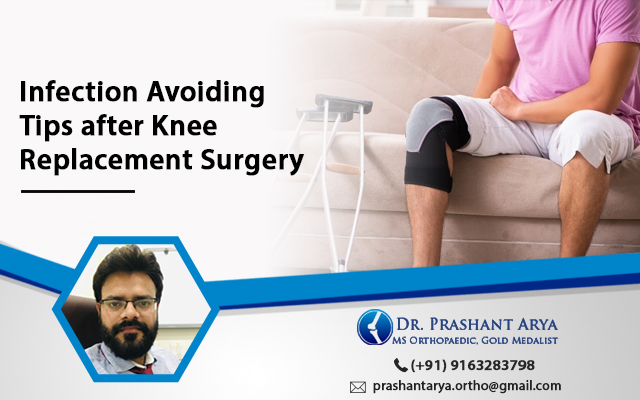Introduction
Knee replacement surgery is necessary for severe and persistent knee pain or swelling that affects a patient’s ability to carry out daily activities. However, people who have knee replacement surgery have a chance of developing a knee replacement infection, says Dr Prashant Arya, a knee replacement specialist in Salt Lake.
Under normal circumstances, most people are free from pain and regain their mobility after surgery. However, some people develop this infection.
In the following section, Dr Prashant Arya explains everything patients should know about knee replacement infection before surgery and how to prevent the infection after surgery.
Knee replacement infection?
A knee replacement infection is usually caused by the invasion of harmful bacteria in the wound after surgery. There is also a chance of its occurrence around the artificial implant that replaces the knee joint.
The infection can occur any time during the hospital stay after surgery or when a person goes home after surgery or even after months or years after surgery.
Signs and symptoms
According to Dr Prashant Arya, the best knee replacement doctor in Kolkata, a person who experiences any of the following symptoms may have a knee replacement infection:
- Pain while walking, event at the point in your recovery when the doctor said walking should be pain-free
- Increase in stiffness and pain in the artificial joint
- The area around the incision or the whole knee feels warm and tender to touch and the skin looks red
- A liquid that smells and is grey in colour drains from the incision,
- A fever above 37.8°C (100°F)
- Chills or night sweats
- Fatigue
How to prevent knee replacement infection?
Dr Prashant Arya, who performs knee replacement treatment in Newtown, lists the steps that help reduce the risk of infection during operation –
- Use antibiotics: Make sure antibiotics are given just before, during, and after surgery for up to 24 hours.
- Ensure short operation time: Surgeons should ensure that operations do not drag on for too long as an open wound is vulnerable to infection.
- Reduce people’s presence: Limit the number of people present in the operation room. This measure will reduce the bacteria in the room and decrease the risk of infection.
- Use sterile equipment: The theatre, instruments, the artificial joint, everything that comes in touch with the operation site should be sterilized.
- Use chlorhexidine: Wash the patient’s skin with chlorhexidine. The antiseptic will reduce the number of harmful bacteria on the skin before surgery.
After a person goes through a knee replacement surgery, the following measures will help reduce the risk of infection:
- Follow the advice of the doctor on how to treat the wound
- If any cut wounds or burns occur, clean and cover them as soon as possible
- Infections in the mouth can spread to the artificial joint. Therefore, maintain dental hygiene.







Leave A Comment